Page Content
Kwakwani is an isolated village in the South American country of Guyana. As part of Project Overseas, Alberta teacher Chantel Walker spent two weeks in the village this past summer, conducting professional development with local teachers.
What is Project Overseas?
Project Overseas is a joint endeavour by the Canadian Teachers’ Federation (CTF) and its member organizations to give professional assistance to fellow teachers in developing countries. The project takes place during the months of July and August.
Started in 1962 with one program in Nigeria, Project Overseas has helped teacher organizations in more than 50 countries in Africa, Asia, the Caribbean and the South Pacific. Since its inception, a total of 1,853 Canadian teachers have participated in the program. Currently, approximately 50 volunteers are sent each summer to about a dozen countries.
The deadline to apply for the program this year is Oct. 30.
More information is available at
www.teachers.ab.ca. Click on For Members" then "Programs and Services" then International Co-operation."
This past summer, 10 Alberta teachers participated in Project Overseas, travelling to seven different countries. Here is a sampling of first-person accounts of their experiences.
Stuff and nonsense
South American experience puts life in perspective
Chantel Walker
Guyana
"If we know exactly where we’re going, exactly how to get there, and exactly what we’ll see along the way, we won’t learn anything."
—The Road Less Travelled, M. Scott Peck
At the start of every school year, I get excited about all the "stuff" I will buy for the year ahead. This year was different. That’s because I spent part of my summer in the South American country of Guyana, sharing my knowledge of guidance counselling as part of Project Overseas.
After hours of travel, first by plane to Georgetown and then by road, five other teachers from across Canada and I crossed the Berbice River via a makeshift ferry boat in an eight-person van that was filled with 13 people and luggage.
We had travelled for two days on almost impassable roads to the small isolated village of Kwakwani. As we entered the village to drive to our home for the next two weeks, I looked in wonder at the modest homes, most with no electricity or running water. As I gazed at the chickens, goats and cows, with their ribs sticking out, roaming the streets looking for food and eating from garbage piles while leaving smouldering manure patties behind, my thoughts and feelings were mixed.
I experienced joy at having brought my closed-toe shoes—a requirement when teaching in this country—my flashlight and bottled water, but there was also a sense of unease as I wondered what I had gotten myself into and whether I should seriously consider becoming a vegetarian.
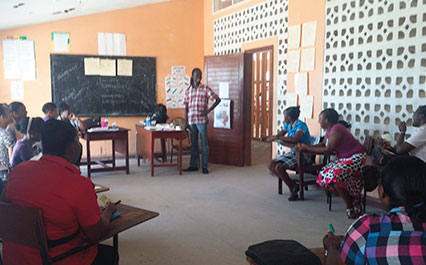 For most of the Guyanian teachers who travelled to Kwakwani, the next two weeks would be the only professional learning they would have in their teaching careers. The teachers were obviously grateful, as we started each lesson with laughter and they engaged in energizers before moving into lively discussions about multiple intelligences and learning styles of students and how to adapt instruction to meet diverse students’ needs, both academically and emotionally. It was I who learned so much from this beautiful country and the committed, courageous and passionate teachers.
For most of the Guyanian teachers who travelled to Kwakwani, the next two weeks would be the only professional learning they would have in their teaching careers. The teachers were obviously grateful, as we started each lesson with laughter and they engaged in energizers before moving into lively discussions about multiple intelligences and learning styles of students and how to adapt instruction to meet diverse students’ needs, both academically and emotionally. It was I who learned so much from this beautiful country and the committed, courageous and passionate teachers.
I learned about a government that has little to no understanding of what these teachers endure daily, with large class sizes, limited or nonexistent resources and daily required paperwork.
The government requires standardized cumulative testing in grades 2, 4 and 6 for students to enter secondary school. In some cases, due to the remote location of the teachers, they have to travel and pay for the photocopying of these mandated exams themselves.
I listened to stories of teachers working in conditions of extreme heat and/or flooding, some paddling one hour each way on the river to work. I listened to stories of teachers who have to cover their personal items in their homes each day to keep bat excrement off their clothes and stories about teachers who have bars on their windows to feel safe.
I listened in disbelief at stories about poisonous snakes found in kitchens and many stories of the inequalities between men, women and children. I listened to these stories while teaching each day in a school with no running water, intermittent electricity, one scanner for photocopying and worn chalkboards almost stripped from years of use. Having my years’ worth of accumulated stuff became less and less important.
I am grateful to the teachers in Guyana for reminding me that teaching isn’t about the stuff we accumulate. I left with a group of teachers from across Canada "not knowing exactly where we’re going, exactly how to get there, and exactly what we’ll see along the way" and I learned so much.
Recently I was transferred to a new school, to a new position, to a new grade level with new students and new staff where my years of accumulated stuff is no longer useful. Luckily for me, my experience in Kwakwani reminded me that I can inspire, engage and create with nothing more than my head full of professional learning and my heart filled with a desire to make a difference.
Chantel Walker is the guidance counsellor at Hunting Hills High School in Red Deer.
‘Nature Island’ a hidden Caribbean gem
Adelina Fabiano
Dominica
Embarrassingly, when I first received the call from Project Overseas that I was going to Dominica, I hesitated a moment as I had to quickly "Google" its exact location. I knew it was in the glistening waters of the Caribbean but knew very little about it. Months later I would grow an everlasting, undeniable affection towards this mysterious volcanic island in the West Indies.
I have been trying to find the exact words to describe the beauty of this land, humble and unassuming like the very extraordinary people that inhabit it. From hot natural soothing springs, countless cool waterfalls and lush green forests, to calm and collected iguanas, or crimson perennials sprouting from all directions, Dominica, in all its grandeur, has left a distinct image in my consciousness.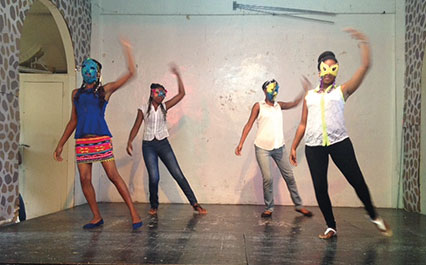
These images are simply the backdrop to the overall experience I was blessed with from Project Overseas. Collaborating with a consummate artist and passionate educator, my Dominican co-tutor and I embarked on a two-week workshop specializing in the instruction of performing arts. Aspiring and veteran teachers, from pre-school to secondary, travelled from all corners of the island to participate in a creative collaboration that included mask making, acting strategies and movement-inspired activities.
It was about finding innovative ways to approach curriculum through the arts that would foster student engagement and enhance student learning. Assuming great risk, teachers danced, acted and interacted, culminating in a final group performance that paid homage to the aptly named "Nature Island."
Instead of using the clichéd term "life-changing" experience, I think it’s more apt to say this added richness to my life trajectory. I travelled to Dominica like a wide-eyed child, but left with a deep sense of humility that left me distinctly wiser and energized as I enter my twelfth year of teaching.
Dominica, with its dedicated teachers and its exquisite culture, is truly the Caribbean’s hidden gem. How grateful I am to have had this momentary magical glimpse.
Adelina Fabiano teaches English language arts, Italian and drama at St. Alphonsus School in Calgary.
Island delivers remarkable and memorable experience
Kim Carson
St. Lucia
The children of St. Lucia are blessed to have a dedicated group of educators working with them to make their educational experience positive and rewarding. This summer I was fortunate to join three other Canadian teachers and participate in Project Overseas in St. Lucia. We had the opportunity to experience cultural events, visit memorable sites and connect with our partner organization.
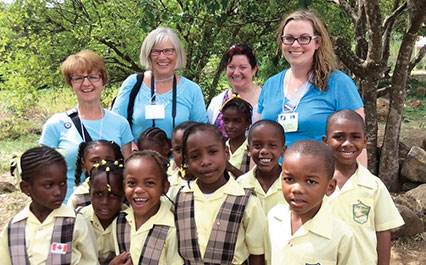 While there, our Canadian team, along with our St. Lucian co-tutors, delivered professional development sessions for approximately 80 teachers on various topics, including authentic assessment, differentiated instruction, multiple intelligences, balanced literacy and autism spectrum disorder. Throughout the two weeks of the workshops, the participants were eager, enthusiastic and receptive to sharing their ideas and acquiring many new skills and strategies from the presentations and from their colleagues.
While there, our Canadian team, along with our St. Lucian co-tutors, delivered professional development sessions for approximately 80 teachers on various topics, including authentic assessment, differentiated instruction, multiple intelligences, balanced literacy and autism spectrum disorder. Throughout the two weeks of the workshops, the participants were eager, enthusiastic and receptive to sharing their ideas and acquiring many new skills and strategies from the presentations and from their colleagues.
The participants’ goals were to capture as many ways to enhance student learning and to share their new knowledge and strategies with their colleagues back at their respective schools. By building the capacity within their country, they are working together on supporting the common goal of quality education for all.
During the workshops, building collegial and collaborative partnerships with other Canadian and overseas teachers and expanding my global perspectives on education were certainly the highlights for me. During the entire project, the St. Lucia Teachers’ Union executive and members made the Canadian team feel so welcomed and part of their organization.
Fostering collegial partnerships benefits the children of our world. Throughout this experience I was able to explore ways to refine my own professional skills and share best practices and ideas with my colleagues. This reciprocal teaching and learning practice embraces the philosophy that all students deserve access to quality education. Through this ongoing dialogue and exchange we are reinforcing this belief. I feel privileged to be part of this remarkable and memorable experience.
During my journey I maintained a blog at kimcarsonpo2015.weebly.com, which contains additional details and photos.
Kim Carson is the principal of Thorhild Central School.
L’amour d’enseigner partagé en Haïti
Roxane Thomas
Haiti
Haïti est une ile aux mille splendeurs peuplée d’êtres attachants débordants de joie de vivre. Participer à Projet outremer et rencontrer des enseignants passionnés a été pour moi un immense privilège!
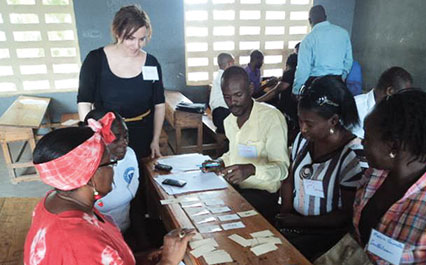 Mes trois collègues canadiennes et moi avons collaboré avec quatre coéquipiers haïtiens à la préparation de semaines de formation avec le désir commun d’offrir une éducation de qualité. Au menu : échanges d’idées, de stratégies, de pratiques, de culture, d’opinions et de valeurs. Comme l’a si bien dit l’un des instructeurs haïtiens : « La couleur de notre peau nous différencie, mais l’amour de la pédagogie nous réunit! »
Mes trois collègues canadiennes et moi avons collaboré avec quatre coéquipiers haïtiens à la préparation de semaines de formation avec le désir commun d’offrir une éducation de qualité. Au menu : échanges d’idées, de stratégies, de pratiques, de culture, d’opinions et de valeurs. Comme l’a si bien dit l’un des instructeurs haïtiens : « La couleur de notre peau nous différencie, mais l’amour de la pédagogie nous réunit! »
Plus de 120 enseignants haïtiens ont participé aux sessions de formation. Certains ont voyagé des heures, d’autres des jours, pour y assister. Plusieurs ont fait d’énormes sacrifices pour venir augmenter et partager leurs connaissances.
C’est en riant qu’ils découvraient nos jeux d’apprentissage et avec enthousiasme qu’ils s’exerçaient à appliquer les nouvelles stratégies, en se demandant parfois : « Comment cela sera-t-il possible avec si peu d’espace et de matériel dans nos écoles? ». Enseigner autrement est pour les Haïtiens un défi quotidien.
J’ai souvent dû retirer mes lunettes canadiennes pour mieux voir. Cela m’a permis d’être davantage à l’écoute de nos hôtes pour explorer avec eux les possibilités d’utiliser des ressources locales à transformer en outils d’apprentissage répondant à leur réalité. En effet, où qu’il se trouve, l’enseignant doit adapter sa pratique à la communauté, à la culture et à l’espace environnant. Pour cette leçon d’amour, Haïti, merci! Mèsi anpil!
Roxane Thomas enseigne à l’École Desrochers de Jasper.
Culturally immersive experience a reminder of social responsibility
Colette Mondor
St. Kitts
"So how was your summer?"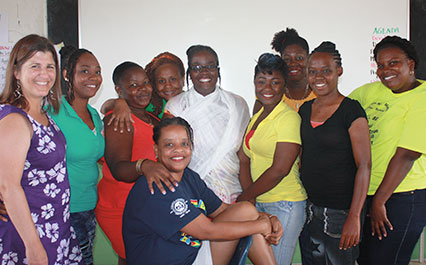
When you participate in Project Overseas, it is hard to answer that question with a standard "great, but busy" because you want to share how amazing your July was. You saw and learned so much, a short answer just won’t do.
I would describe Project Overseas as a culturally immersive experience that provides participants with as much, if not more, professional development than they provide to their workshop participants. Our first week in St. Kitts was a whirlwind of cultural events, tours of both islands, visits to schools, meetings with dignitaries and connecting and collaborating with our local co-tutors.
We truly felt that what we were doing was valued and significant when we met with the minister of education. During week two and three we ran our workshops with the help of our co-tutors.
The focus of the workshops in St. Kitts this year was special needs education: differentiated instruction, emotional intelligence, behaviour management and individual education plans.
I was impressed by the participants, all of whom had given up two weeks of their summer holidays to attend the workshops. They were open and, by the end, motivated to look at special education in a different way. Participants were eager to modify their current teaching practices to be more inclusive and differentiated, but they were also honest about the real roadblocks they face.
I created a website and a Google+ community for the workshop, to facilitate easy access to the materials we provided, as well as additional content so that we can continue to support the teachers throughout the year: https://sites.google.com/site/stkittspo2015/.
So, how was my summer?
For me, the experience reminded me that, as a teacher, I am a part of a global fellowship and therefore it is my responsibility to advocate for public education worldwide. It also made me grateful to work in Alberta, where we have easy access to amazing resources, professional development and effective teacher training.
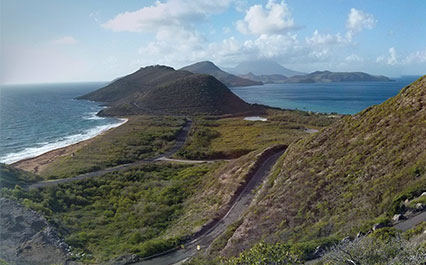
Colette Mondor is a Grade 2 teacher at Rutherford School in Edmonton.
Le Togo – toujours au cœur de nos vies
Simone Desilets et Simon Pagé
Togo
Depuis notre retour de ce petit pays d’Afrique de l’Ouest, il ne se passe pas un seul jour sans que nos collègues togolais soient dans nos pensées. Des souvenirs refont surface, flottent sur l’eau claire de la vie qui continue. Un profond sentiment de gratitude pour ce mois de formation et de partage nous étreint.
Quelle belle aventure nous avons vécue dans le cadre de Projet outremer 2015! Nous parlons maintenant de cette expérience transformatrice à qui veut bien nous entendre. Émus par la musicalité de la langue éwé et inspirés par la philosophie de nos collègues togolais, nous avons beaucoup appris de leur accueil chaleureux, de leur générosité et sens inné de la communauté. Nous avons aussi découvert que nous avions beaucoup en commun avec eux.
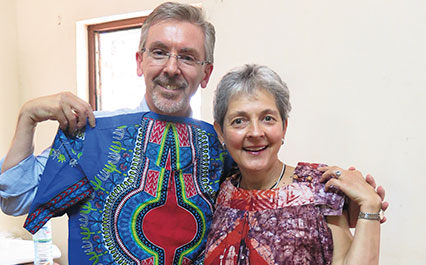 Le travail de formation d’enseignants dans le cadre d’une collaboration internationale n’a été qu’un aspect de l’expérience que nous avons vécue. Nous avons donné des ateliers sur plusieurs sujets dont : la planification de leçons, la littératie, les mathématiques par le jeu et la démarche scientifique.
Le travail de formation d’enseignants dans le cadre d’une collaboration internationale n’a été qu’un aspect de l’expérience que nous avons vécue. Nous avons donné des ateliers sur plusieurs sujets dont : la planification de leçons, la littératie, les mathématiques par le jeu et la démarche scientifique.
Aujourd’hui, c’est le sentiment de nous être rapprochés de nos collègues africains qui demeure. Leur ténacité, courage, dévouement et énergie pétillante, malgré un manque démesuré de ressources et d’appui, sont exemplaires. La distance et les circonstances nous séparent bien sûr, mais au bout du compte nous sommes semblables et solidaires en matière d’éducation puisque nous partageons la même passion, enseigner, et le même objectif : donner à chaque élève le coup de pouce dont il a besoin.
Depuis notre retour dans nos salles de classe, ce que nous avons appris cet été en collaboration avec nos collègues africains refait parfois surface. Nous savourons alors ces précieux souvenirs comme s’il restait en nous un peu de ce magnifique continent. Il nous a suffi de fouler leur terre pour que la solidarité et l’amitié grandissent entre nous.
Simone Desilets, enseignante d’Edmonton Catholic Schools, actuellement chargée de cours en prêt de service au Campus Saint-Jean.
Simon Pagé, enseignant de French Language Arts et d’études sociales à l’École Secondaire Paul-Kane High School, Saint-Albert Public School District.
Teachers are truly connected
Vanda Rufli
Ghana
I felt astonished and elated when I received a phone call explaining that I had been selected to participate in Project Overseas and that I would be going to Ghana, Africa. It was an adventure that I knew that was going to have a profound effect on me ... and it did.
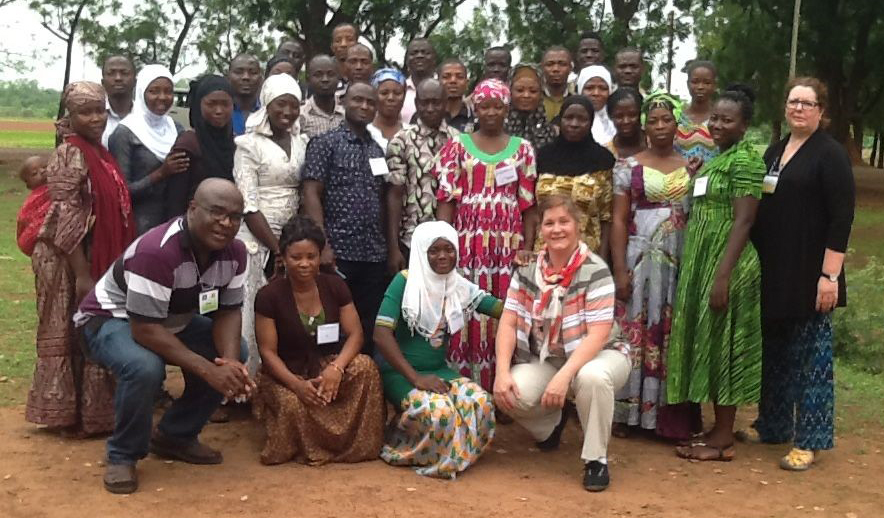
I travelled to Ghana with seven other teachers from all parts of Canada. Divided into two teams, we met each other for orientation in Ottawa before heading to Accra, Ghana’s capital, for co-ordination and planning with the staff of the Ghana National Association of Teachers (GNAT).
Our next week was spent in Tamale, in the Northern region, where we gave presentations to teachers who were classified as new entrants (one to eight years of teaching experience). We covered topics like classroom management, academic skills, digital citizenship, wellness, teaching concerns and mentorship programs. This professional development opportunity happens every three years and is sponsored by GNAT.
We visited a school in each of the three regions where we did presentations. Fundraising was put together by a number of teachers and school supplies were purchased in Accra and then presented to the students and community. Education, even in its simplest form, is greatly valued and a lot of sacrifice by parents, students and teachers helps to create their learning communities. At times the needs seem to be so overwhelming; however, what was presented was very gratefully accepted.Our next community was Navrongo, in the Upper East region. We gave our presentations to a group of 50 new entrants, and when the headmasters joined for the mentorship program, the number increased to over 80 participants. The whole professional development event reached more than 300 participants each week. Even though these teachers face challenging working conditions on many levels, that "teaching twinkle" was ever present, and so there were many questions and abundant sharing opportunities.
Our last presentation was in Berekum, in the Brong-Ahafo region. This was the largest group of participants. We travelled many kilometres together, in a van with an amazing driver. All the people we met were welcoming, warm and fun-loving. Their enthusiasm made long days a joy and made us all realize that we teachers are truly all connected. We were able to experience Ghanaian culture through Canada Night and Ghana Night performances, and visually through our travels. This was an experience I will never forget, either personally or professionally.
Vanda Rufli teaches K–9 in a one-room school at the Wild Rose Hutterite Colony near Vulcan.
Dominican teachers face inclusion challenge
Jessica Kornder
Dominica
Dominica has earned the title "Nature Island" — and the moment you arrive, you understand why. It is a spectacular piece of paradise that has more than 300 hidden waterfalls, rivers and hot springs waiting to be discovered. The spectrum of green is incredible — the deep green rainforests, the emerald green of the waterfalls and pools, the calm blue-green of the ocean.
But all of this pales in comparison to the colour and warmth of the Dominican people. There are several uniquely diverse communities throughout the island, from the bustling capital city of Roseau to the quiet, indigenous Kaliango communities — the generosity and exuberance of the people are undeniable.
With support from the Alberta Teachers’ Association and the Canadian Teachers’ Federation, I had the pleasure of working alongside my talented in-country co-tutor to provide a two-week math workshop to a group of 22 young, vibrant Dominican teachers. Their eagerness to be part of the profession was obvious. They were ready to participate, learn, discuss and reflect.
A lot of the dialogue focused on inclusive education — knowing that although it can often be challenging for classroom teachers, regardless of where you are teaching, it benefits all children tremendously. These fresh-faced teachers are ready to meet the challenge head-on and come up with innovative ways to reach all of their students.
Upon my return and going into a new school year, I have reflected on my experience with my Dominican colleagues, and I want to harness their energy and enthusiasm. I want to maintain that notion that "every child is gifted … they just unwrap their packages at different times."
What wonderful classrooms we would have around the world if we worked diligently to see our students as gifts to be unwrapped and cherished. Let us work to support each other, globally and locally, in this task and see universal education as a gift to our future.
Jessica Kornder is a Grade 1 teacher and learning coach at École/Escuela Grandin School in Edmonton.
